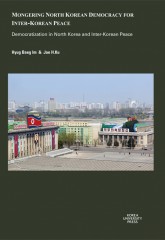Mongering North Korean Democracy for Inter-Korean Peace :Democratization in North Korea and Inter-Korean Peace
ISBN-13: 978-89-7641-886-9
Hardcover: 176 pages
Purchase :
We have written this book on the possibility of inter-Korean peace through North Korean democratization in a milieu of both pessimism and wishful thinking regarding the future of the North Korean dictatorial regime. This book will not be calculating and predicting the probability of North Korean regime collapse or survival. Rather this book plans to examine vague, unsorted, and undigested hopes for democracy in North Korea and inter-Korean peace and from them find possibilities that may be realized in the near future.
about author
Hyug Baeg Im, the lead author, is the Professor at the Department of Political Science and International Relations, Korea University. He received B.A. in political science from Seoul National University, M.A. and Ph.D. in political science from the University of Chicago. He served as an Executive Council Member, International Political Science Associations (IPSA, 2007-2012). He was the Dean at the Graduate School of Policy Studies (2008-2012), the Director of Institute for Peace Studies and the Director of BK21 Research and Education Corps. (2008-2012) at Korea University. He had been a professor of political science at Ehwa Womans University, 1991-1998. He had served as a presidential adviser of the president Kim Dae Jung, Roh Moo Hyun and Lee Myung Bak. He had advised for Ministry of National Unification and that of National Defense, and National Assembly Research Servic ROK. He taught at Georgetown University (1995-1996), Duke University (1997), Stanford University (2002-2003) and conducted researches at National Endowment for Democracy (1995-1996) and USKI, Johns Hopkins University SAIS (2012-2013), and Asia Center, Seoul National University (2014-2015). He received the Order of Service Merit from ROK Government (2003), the Best Academic Award from Korean Political Science Association (2010), and the Best Academic Award 2015 from National Academy of Science, ROK (2015).
His major publications since 2000 include: “Crony Capitalism in South Korea, Thailand, and Taiwan: Myth and Reality,” (co-authored with Kim, Byung-Kook), Journal of East Asian Studies (2001); “Faltering Democratic Consolidation in South Korea: Democracy at the End of Three Kims Era,” Democratization (2004); “The US role in Korean Democracy and Security since Cold War Era,” International Relations of the Asia-Pacific (2006); “Inter-Korean Relations and Cross-Strait Relations through the Regional Integration Theories,” Asian Survey (2011); “Better Democracy, Better Economic Growth?” International Political Science Review (2011); Democratic Development and Authoritarian Development Compared,” eds. by Shiping Hua and Ruiha Hu, East Asian Development Model (2015). “South Korean Democratic Consolidation in Comparative Perspective,”eds. by Larry Diamond and Byung Kook Kim, Consolidating Democracy in South Korea (2000); “Christian Churches and Democratization in South Korea,” eds. by Tun-jen Cheng and Debbie Brown, Religious Organizations and Democracy in Contemporary Asia (2004); “Development and Change in Korean Democracy since the Democratic Transition in 1987 ,” eds. by Yin-wah Chu and Wong, Siu-lun, East Asia’s New Democracies (2010); “The Origins of Yushin,” eds. by Byung-Kook Kim and Ezra F. Vogel, The Park Chung Hee Era (2011); “The Two Turnovers in South Korea and Taiwan,” (co-authored with Yun-han Chu), Democracy in East Asia (2013); “Political Response To Economic Crisis in 1997 and 2008 South Korea,”ed. by Hideko Magara, Economic Crisis and Policy Regimes (2014); “Social Welfare, Globalization and Democracy in South Korea,” eds. by Hyun-Chin Lim, Wolf Schäfer, Suk-Man Hwang, Global Challenges in Asia (2014).
Jae H. Ku, the co-author, is the Director of the US-Korea Institute at the Johns Hopkins University School of Advanced International Studies. Before joining the US-Korea Institute, he was the Director of Human Rights in North Korea Project at Freedom House. He has taught at the Johns Hopkins University School of Advanced International Studies, Brown University, and Yonsei University (Seoul, Korea). His research interests are: Inter-Korean Relations, U.S.-Korea relations, Democracy in Asia, and Human Rights in North Korea. He has been a recipient of both the Fulbright and Freeman fellowships. He received his Ph.D. from the Johns Hopkins School of Advanced International Studies, M.Sc. from the London School of Economics, and A.B. from Harvard University.
His recent works include: Energy Security Cooperation in Northeast Asia, Ed. By Bo Kong and Jae H. Ku, Routledge, New York, 2015; “The Decline of Political Participation in Korea between 2000-2011,” in Incomplete Democracies in the Asia-Pacific, Ed. By Giovanna Maria Dora Dore, Jae H. Ku, and Karl D. Jackson, Palgrave MacMillan, London, 2014; Co-Editor, China’s Domestic Politics and Foreign Policies and Major Countries’ Strategies Toward China, Korea Institute for National Unification, Seoul, South Korea, December 2012; Co-Author, “The Uneasiness of Big Brother-Littler Brother Relationships: China’s Relations with Neighboring Vietnam, Laos, Cambodia, Mongolia, and Myanmar,” in China’s Domestic Politics and Foreign Policies and Major Countries’ Strategies Toward China, Korea Institute for National Unification, Seoul, South Korea, December 2012; Co-Author, Northeast Asia in Afghanistan: Whose Silk Road?, U.S.-Korea Institute, SAIS, Johns Hopkins University, March 29, 2011; and Co-Editor, Nuclear Security 2012:Challenges of Proliferation and Implication for the Korean Peninsula, Korea Institute for National Unification, Seoul, South Korea, December 31, 2010.
